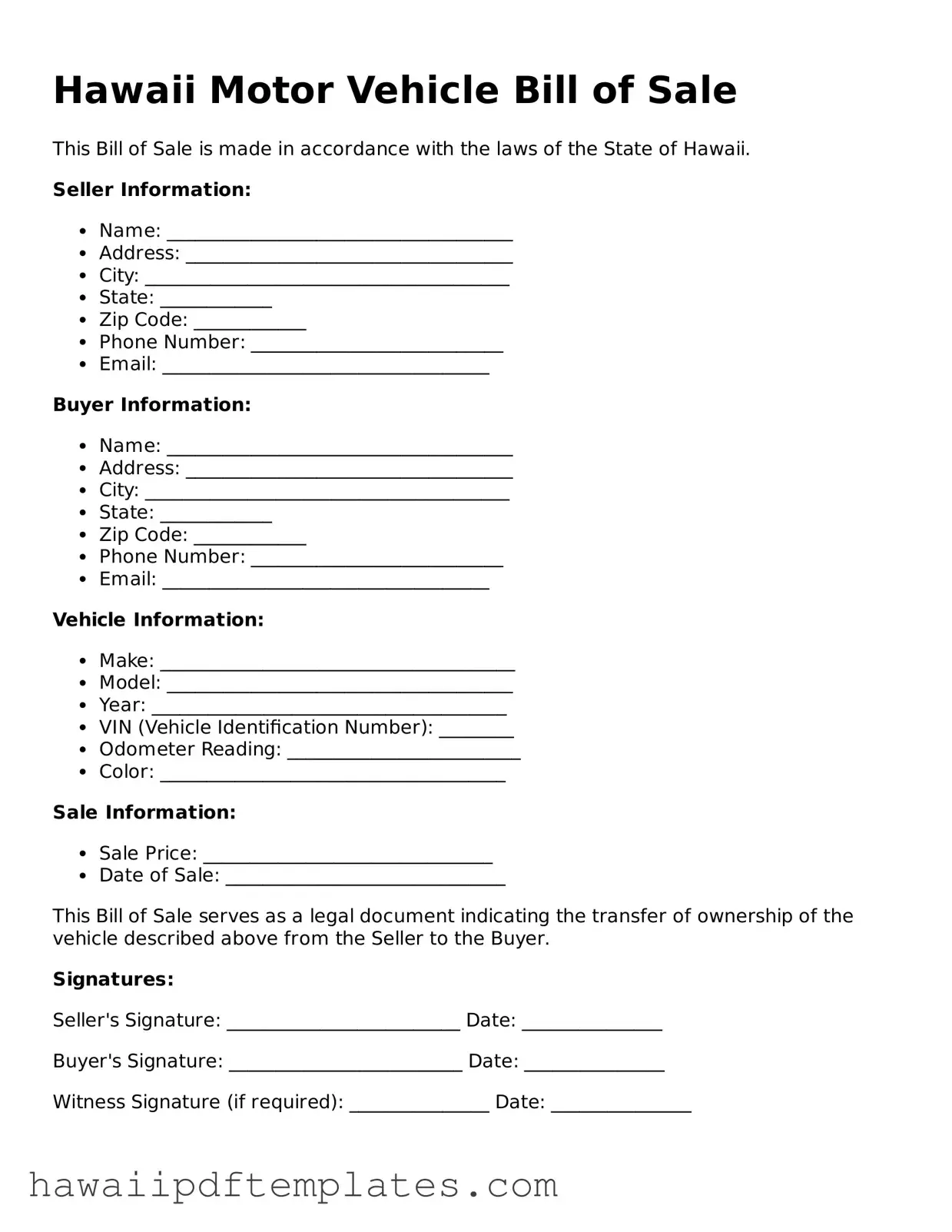Free Motor Vehicle Bill of Sale Document for Hawaii State
Frequently Asked Questions
-
What is a Motor Vehicle Bill of Sale in Hawaii?
A Motor Vehicle Bill of Sale is a legal document that records the transfer of ownership of a vehicle from one party to another. In Hawaii, this form serves as proof of the transaction and includes essential details about the vehicle and the buyer and seller.
-
Why do I need a Bill of Sale?
The Bill of Sale is crucial for both the buyer and the seller. For the buyer, it provides proof of purchase, which may be required for registration and titling. For the seller, it offers protection by documenting the sale and the date it occurred, which can help avoid future liability.
-
What information is included in the Bill of Sale?
The Bill of Sale typically includes:
- The names and addresses of both the buyer and seller
- The vehicle's make, model, year, and Vehicle Identification Number (VIN)
- The sale price
- The date of the sale
- Signatures of both parties
-
Is a Bill of Sale required in Hawaii?
While a Bill of Sale is not legally required for all vehicle transactions in Hawaii, it is highly recommended. It provides a clear record of the sale and can simplify the registration process for the buyer.
-
Where can I obtain a Bill of Sale form?
You can find a Motor Vehicle Bill of Sale form online through various state resources or legal websites. Additionally, some local offices may provide printed forms that you can fill out in person.
-
Do I need to have the Bill of Sale notarized?
Notarization is not typically required for a Bill of Sale in Hawaii. However, having the document notarized can add an extra layer of authenticity and may be beneficial if any disputes arise in the future.
-
What if the vehicle has a loan or lien?
If the vehicle has an outstanding loan or lien, the seller must resolve this before completing the sale. The lienholder should be contacted to obtain a lien release, which ensures that the buyer receives clear title to the vehicle.
-
How do I register the vehicle after purchasing it?
After obtaining the Bill of Sale, the buyer must take it, along with other required documents, to the local county office to register the vehicle. This typically includes proof of insurance and identification.
-
Can I use a Bill of Sale for a vehicle purchased out of state?
Yes, a Bill of Sale can be used for vehicles purchased out of state, as long as it includes all necessary information. However, additional documentation may be required for registration in Hawaii.
-
What should I do if I lose the Bill of Sale?
If the Bill of Sale is lost, the buyer and seller can create a new document that includes the same information. Both parties should sign it again. It's important to keep a copy for future reference.
Other Common Hawaii Forms
How to Sell a Car in Hawaii - This document empowers both parties to have confidence in the sale process.
For effective governance of your LLC, consider utilizing the essential tools for an Operating Agreement that clarifies roles and responsibilities. You can find a helpful guide on Operating Agreement templates that can streamline this process.
Quit Claim Deed Hawaii - This form allows the current owner, known as the grantor, to relinquish their interest in the property.
Steps to Writing Hawaii Motor Vehicle Bill of Sale
After obtaining the Hawaii Motor Vehicle Bill of Sale form, you will need to complete it accurately to ensure a smooth transfer of ownership. This form requires specific information about the vehicle and the parties involved in the sale. Follow these steps to fill it out correctly.
- Begin by entering the date of the sale in the designated space.
- Provide the seller's full name and address. Ensure that the information is current and accurate.
- Next, fill in the buyer's full name and address. This should also be up-to-date.
- Enter the vehicle's make, model, year, and color. This information helps identify the vehicle being sold.
- Include the vehicle identification number (VIN). This unique number is essential for vehicle identification.
- Indicate the sale price of the vehicle clearly. This should reflect the agreed amount between the buyer and seller.
- Both the seller and buyer should sign and date the form at the bottom. Signatures confirm the agreement and transfer of ownership.
Once the form is completed and signed, ensure that both parties retain a copy for their records. This document serves as proof of the transaction and may be needed for future reference, such as registering the vehicle or for tax purposes.
Misconceptions
Understanding the Hawaii Motor Vehicle Bill of Sale form can be confusing. Here are some common misconceptions that people often have:
- It is not necessary for private sales. Many believe that a bill of sale is only required for transactions involving dealerships. However, a bill of sale is essential for private sales as it provides proof of ownership transfer.
- Only the seller needs to sign the document. Some think that only the seller's signature is required. In reality, both the buyer and seller should sign the bill of sale to validate the transaction.
- The form is only for cars. Many assume that the bill of sale applies only to automobiles. In fact, it can be used for any motor vehicle, including motorcycles, trucks, and boats.
- It does not need to be notarized. Some people believe that notarization is mandatory for the bill of sale to be valid. While notarization can add an extra layer of authenticity, it is not always required in Hawaii.
Clarifying these misconceptions can help ensure a smoother transaction process when buying or selling a vehicle in Hawaii.
